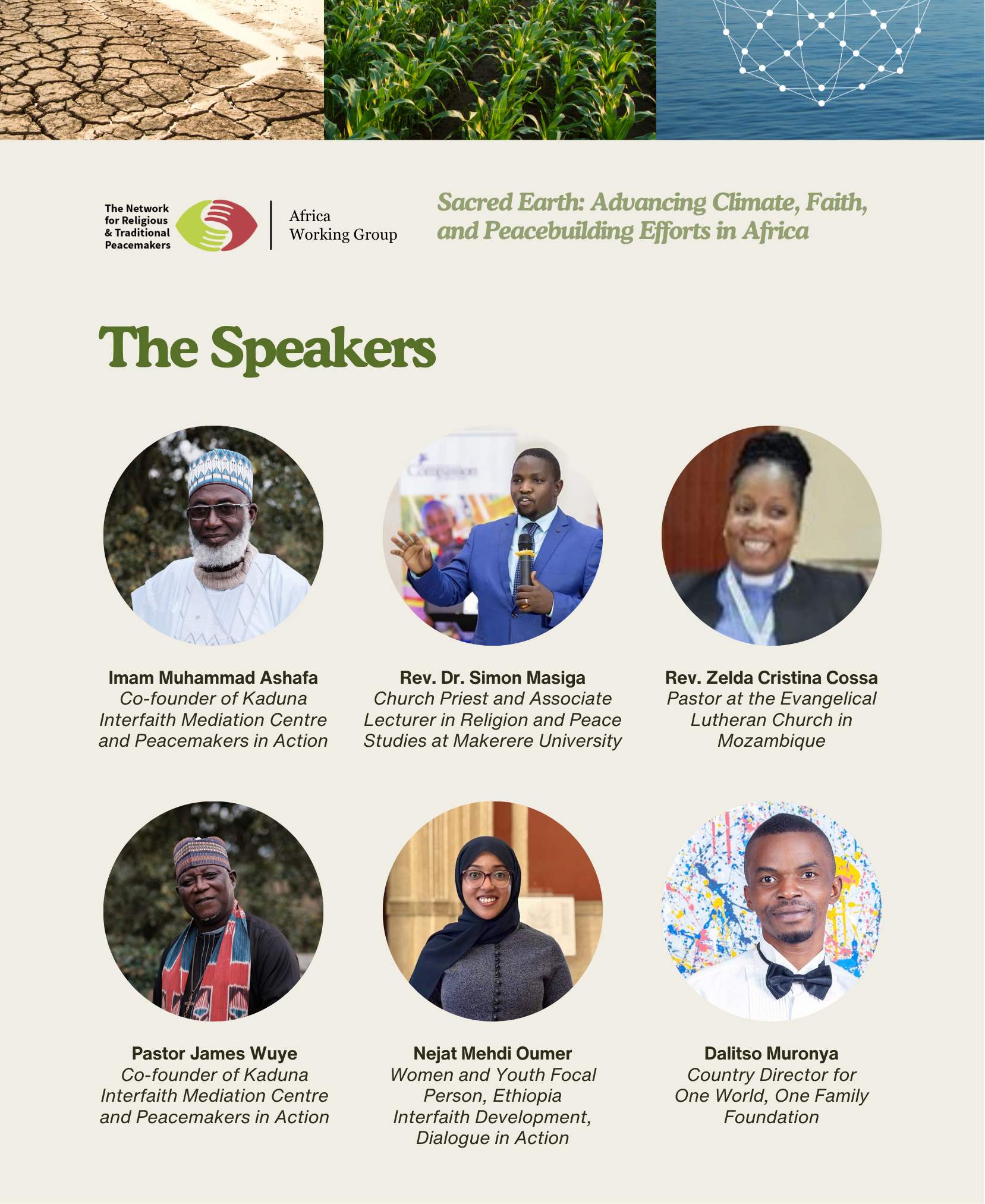Sacred Earth: Advancing Climate, Faith, and Peacebuilding Efforts in Africa
Africa Working Group | September 2025
Climate change is the ultimate threat multiplier, significantly increasing the insecurity of vulnerable communities around the world. In the last 60 years, more than 40 percent of the world’s civil wars have been linked to control over natural resources such as land, oil, and water. Faith leaders and actors are committed and already contributing to environmental protection, conflict resolution, and climate action. Building on the vital work of religious actors and faith-based organizations, the Africa Working Group convened a meeting on September 9th 2025, expanding on the Peacemakers Network’s Sacred Earth multimedia climate project, holding discussions with religious actors and community representatives from Africa who shared their experiences in mediating conflicts and promoting ecological peacebuilding through a faith-based lens.
The distinguished panel included Pastor James Wuye, Imam Muhammad Ashafa, Rev. Dr. Simon Masiga, Mrs. Nejat Mehdi Oumer and Mr. Dalitso Muronya, sharing various strategies for community resilience against climate-related challenges, including water access, economic growth, and interfaith collaboration. These strategies emphasize the crucial role of youth in climate action and peacebuilding efforts. Participants discussed integrating climate change education into religious institutions and highlighted the importance of using religious texts and traditional knowledge to promote environmental stewardship among young people and religious leaders.
Pastor James Bouye and Imam Mohammed Ashafa, co-founders of the Kaduna Interfaith Mediation Center in Nigeria, shared their experiences in mediating religious conflicts and promoting ecological peacebuilding initiatives, emphasizing the role of local communities in fostering peace and resilience amid climate crises. Pastor James discussed the environmental and social challenges in Nigeria, particularly focusing on land use competition, deforestation, and violence in Northern Nigeria. He highlighted the need for Indigenous tree planting as a solution to address ecological degradation and promote peace between farmers and herders. Rev. Dr. Simon Masiga, Church Priest and Associate Lecturer in Religion and Peace Studies at Makerere University, shared best practices for community resilience in climate-related conflicts. Rev. Dr. Masiga discussed the role of climate change in triggering conflicts and displacement in Uganda, highlighting the importance of addressing root causes and strengthening local governance. He shared strategies such as creating access to water, enhancing economic growth, and fostering community-based collaborations to build resilience against climate-related challenges.
Youth’s Role in Interfaith Climate Action
Nejat Mehdi Oumer, Women and Youth Focal Person at Ethiopia Interfaith Development, Dialogue in Action, discussed the significant role of youth in interfaith efforts, particularly in climate action, peacebuilding, and security. She highlighted how youth, guided by their faith, can mobilize communities, advocate boldly, and bridge divides. Oumer emphasized the importance of youth involvement in policy spaces, such as the African Climate Summit, and announced the presentation of the Addis Ababa Declaration, which underscores the involvement of women, youth, and children in climate action and justice. By providing opportunities for youth to collaborate and develop digital plans, they also have successfully influenced their peers through platforms like X (formally Twitter) and LinkedIn.
Climate Education in Religious Institutions
The meeting focused on integrating climate change education into religious and theological institutions. Pastor James and other participants discussed using religious texts and traditional knowledge to encourage environmental stewardship among young people and religious leaders. They emphasized the importance of developing materials for Sunday schools, theological colleges, and other educational settings to incorporate climate-related programs. The group also highlighted initiatives like tree planting campaigns and the establishment of nurseries to promote environmental sustainability and alternative livelihoods in communities affected by deforestation and desertification.
Follow the Peacemakers Network on social

